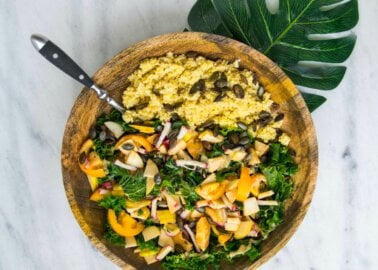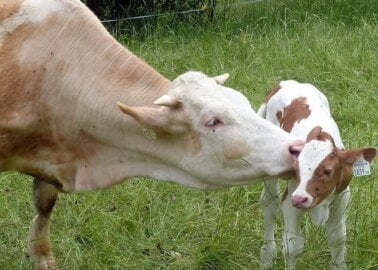Can We Really Call Ourselves ‘Feminists’ if We Eat Eggs?
The human egg is tiny, undetectable to the human eye – and yet it has a powerful, life-giving force that is still polarising nations. Such an innocuous little ovum, yet it holds such an immense power to divide – and to divide people.
What does it mean, then, when people take another female’s eggs from her without a thought or readily pay money for them, knowing that she was imprisoned, her reproductive cycle was controlled and manipulated, and she was forced to bear young on someone else’s timetable?
-
Females’ rights over their own reproductive systems should be respected, no matter the species.
As the battle for control over women’s bodies wages on in countries around the world, feminists are rising up in defence of female reproductive rights. But can we really call ourselves “feminists” if we eat chickens’ eggs?
-
The denial of hens’ rights originates in the same supremacist thinking as the denial of women’s rights.
Some are quick to dismiss the suffering of female members of other species as unimportant. But let’s recall that human females, too, have been dismissed as not important, valuable, intelligent, or worthy of consideration. The justifications that people give for being unconcerned about hens’ suffering and for denying their basic rights are strikingly similar to the justifications that have been given for disregarding women’s suffering and denying their basic rights.

-
Hens aren’t egg machines – they’re individuals with needs and desires.
Chickens are inquisitive, and they can complete complex mental tasks, demonstrate self-control, worry about the future, and pass down cultural knowledge. Like all animals (including humans), they love their families and value their own lives. They look out for their relatives and the other chickens in their group. They have complex social structures, well-developed communication skills, and distinct personalities, just as we do. If you’ve ever talked about a “pecking order”, “hen do”, or “mother hen”, you were describing behaviour that we’ve observed in chickens.

-
Chickens are arguably the most abused animals on the planet.
There are about 32 million hens on UK egg farms, producing 24 million eggs each day. More than half of them are kept in severely crowded battery-style cages and typically have little more usable space than the size of an A4 piece of paper. These birds’ existence is a living hell.
The wire mesh of the cages rubs off their feathers, chafes their skin, and cripples their feet. Farmers cut off part of their beaks with an infra-red laser when they’re just a few days old to prevent them from pecking each other to death in response to the stress of the severe crowding. They often sustain broken bones and suffer from osteoporosis, and disease runs rampant in the filthy, cramped sheds. Many birds die, and the survivors are often forced to live alongside the rotting bodies of dead cagemates.
No real feminist would eat an egg from a “free-range” farm, either. There, hens are typically forced to lay eggs in dark, dirty sheds:
When their egg production begins to wane, these sensitive animals are shoved into cramped crates and endure a harrowing journey to the abattoir.
Over a million chickens die in transit each year in the UK. When the survivors arrive at the abattoir, their legs are shackled and their throats are cut – sometimes while they’re still conscious.
-
Farmworkers manipulate hens’ reproductive systems.
Farmworkers use light and food to manipulate hens’ reproductive systems to induce extra laying cycles, forcing them to produce as many as 300 eggs per year – far more than the 10 to 15 per year their ancestors used to produce in nature. Because of this, they often suffer from cysts, infections, ovarian carcinomas, and reproductive tumours, and sometimes, multiple eggs become lodged inside them. Their bones often shatter from osteoporosis because their bodies are forced to produce massive quantities of eggshells.

-
By eating eggs, we support the slaughter of female chickens.
If treated well, a hen’s life expectancy is about 10 years. On an egg farm, her body will typically give out after just two, if that. When her egg production drops, she is considered “spent” and is thrown into a lorry full of other “spent” females, transported to the abattoir, and strung up by her legs so her throat can be slit or else gassed to death. Her body will likely be turned into chicken soup or food for companion animals – because her flesh is too bruised and battered to be used for anything else.

-
Hens make devoted, doting mothers.
The hen has been turned into an egg machine. But in bygone eras, she embodied the essence of motherhood. The Roman historian Plutarch admired these animals’ mothering instincts, writing that he observed hens “drooping their wings for some [of their brood] to creep under, and receiving with joyous and affectionate clucks others that mount upon their backs or run up to them from every direction; and though they flee from dogs and snakes if they are frightened only for themselves, if their fright is for their children, they stand their ground and fight it out beyond their strength”.

The Renaissance writer Ulisse Aldrovandi said that mother hens present, in every way, “a noble example of love in their offspring”. These females represent the best qualities that any mother can hope to possess: selflessness, generosity, compassion, courage, and unconditional love.
Stand Up to the Systemic Abuse of Females of All Species
Widening our circle of compassion will help end the exploitation of “others”.
Every time you order or request an egg-free meal, you’re standing up for females. With so many delicious plant-based options available across the UK, going vegan is easier than ever. Take our 30-day vegan pledge and we’ll tell you all about them and give you other tricks and tips for making compassionate choices:



